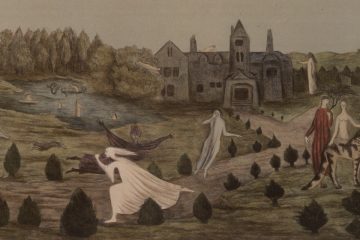Lady Susan by Jane Austen
Written in 1795, Jane Austen’s epistolary novel Lady Susan brims with satire and wit. The recently widowed Lady Susan is beautiful and attractive, yet selfish and manipulative. She flirts atrociously in order to secure a good marriage not only for herself but for her daughter as well.
EXTRACT taken from  www.janeausten.co.uk/lady-susan/
www.janeausten.co.uk/lady-susan/
Lady Susan Vernon to Mr. Vernon
Langford, Dec.
My dear brother,—I can no longer refuse myself the pleasure of profiting by your kind invitation when we last parted of spending some weeks with you at Churchhill, and, therefore, if quite convenient to you and Mrs. Vernon to receive me at present, I shall hope within a few days to be introduced to a sister whom I have so long desired to be acquainted with. My kind friends here are most affectionately urgent with me to prolong my stay, but their hospitable and cheerful dispositions lead them too much into society for my present situation and state of mind; and I impatiently look forward to the hour when I shall be admitted into Your delightful retirement.
I long to be made known to your dear little children, in whose hearts I shall be very eager to secure an interest I shall soon have need for all my fortitude, as I am on the point of separation from my own daughter. The long illness of her dear father prevented my paying her that attention which duty and affection equally dictated, and I have too much reason to fear that the governess to whose care I consigned her was unequal to the charge. I have therefore resolved on placing her at one of the best private schools in town, where I shall have an opportunity of leaving her myself in my way to you. I am determined, you see, not to be denied admittance at Churchhill. It would indeed give me most painful sensations to know that it were not in your power to receive me.
Your most obliged and affectionate sister,
S. VERNON.
Lady Susan Vernon to Mrs. Johnson
Langford.
You were mistaken, my dear Alicia, in supposing me fixed at this place for the rest of the winter: it grieves me to say how greatly you were mistaken, for I have seldom spent three months more agreeably than those which have just flown away. At present, nothing goes smoothly; the females of the family are united against me. You foretold how it would be when I first came to Langford, and Mainwaring is so uncommonly pleasing that I was not without apprehensions for myself. I remember saying to myself, as I drove to the house, “I like this man, pray Heaven no harm come of it!” But I was determined to be discreet, to bear in mind my being only four months a widow, and to be as quiet as possible: and I have been so, my dear creature; I have admitted no one’s attentions but Mainwaring’s. I have avoided all general flirtation whatever; I have distinguished no creature besides, of all the numbers resorting hither, except Sir James Martin, on whom I bestowed a little notice, in order to detach him from Miss Mainwaring; but, if the world could know my motive there they would honour me. I have been called an unkind mother, but it was the sacred impulse of maternal affection, it was the advantage of my daughter that led me on; and if that daughter were not the greatest simpleton on earth, I might have been rewarded for my exertions as I ought.
Sir James did make proposals to me for Frederica; but Frederica, who was born to be the torment of my life, chose to set herself so violently against the match that I thought it better to lay aside the scheme for the present. I have more than once repented that I did not marry him myself; and were he but one degree less contemptibly weak I certainly should: but I must own myself rather romantic in that respect, and that riches only will not satisfy me. The event of all this is very provoking: Sir James is gone, Maria highly incensed, and Mrs. Mainwaring insupportably jealous; so jealous, in short, and so enraged against me, that, in the fury of her temper, I should not be surprized at her appealing to her guardian, if she had the liberty of addressing him: but there your husband stands my friend; and the kindest, most amiable action of his life was his throwing her off for ever on her marriage. Keep up his resentment, therefore, I charge you. We are now in a sad state; no house was ever more altered; the whole party are at war, and Mainwaring scarcely dares speak to me. It is time for me to be gone; I have therefore determined on leaving them, and shall spend, I hope, a comfortable day with you in town within this week. If I am as little in favour with Mr. Johnson as ever, you must come to me at 10 Wigmore street; but I hope this may not be the case, for as Mr. Johnson, with all his faults, is a man to whom that great word “respectable” is always given, and I am known to be so intimate with his wife, his slighting me has an awkward look.
I take London in my way to that insupportable spot, a country village; for I am really going to Churchhill. Forgive me, my dear friend, it is my last resource. Were there another place in England open to me I would prefer it. Charles Vernon is my aversion; and I am afraid of his wife. At Churchhill, however, I must remain till I have something better in view. My young lady accompanies me to town, where I shall deposit her under the care of Miss Summers, in Wigmore street, till she becomes a little more reasonable. She will made good connections there, as the girls are all of the best families. The price is immense, and much beyond what I can ever attempt to pay.
Adieu, I will send you a line as soon as I arrive in town.
Yours ever,
S. VERNON.



0 Comments